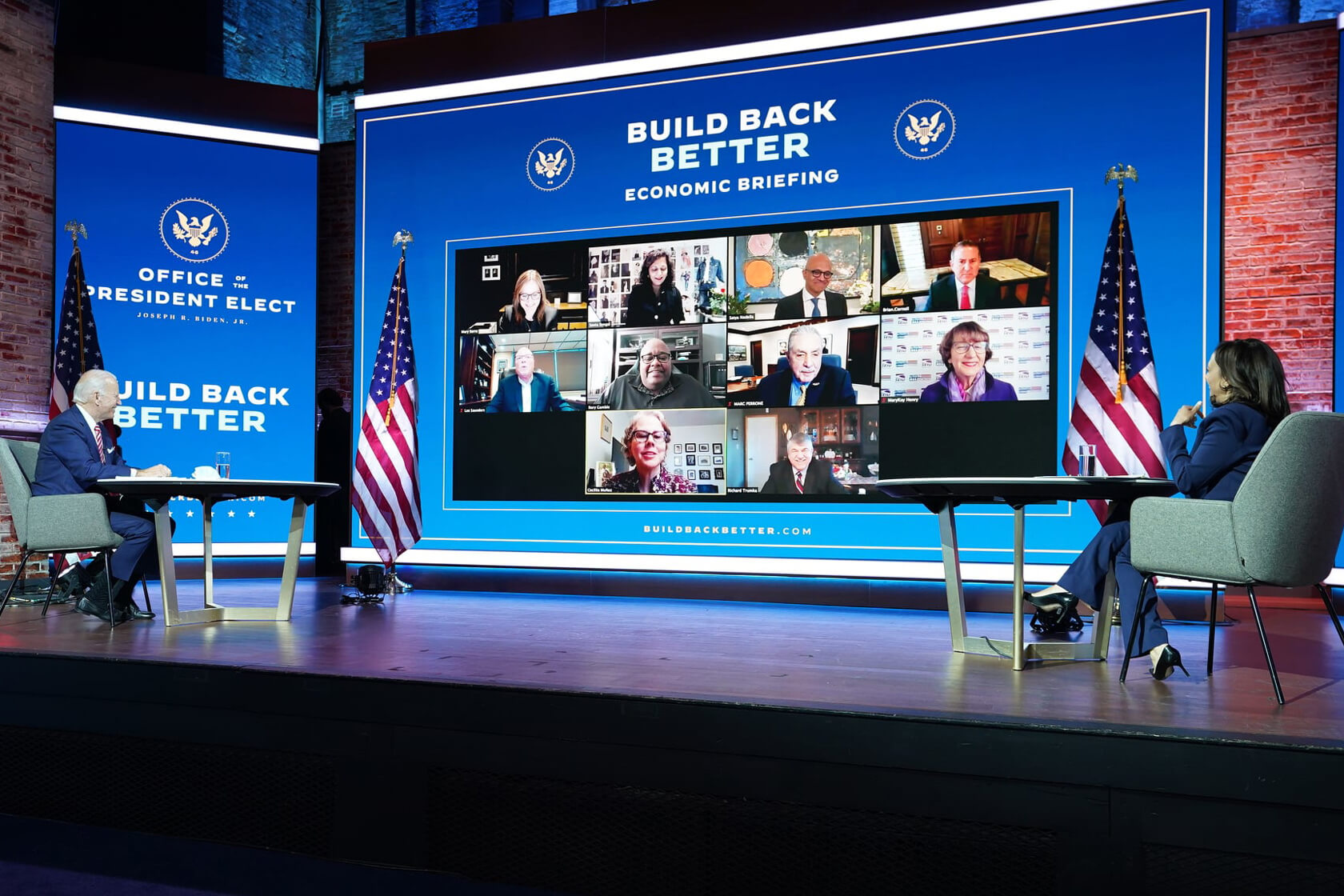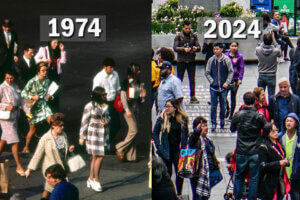West Long Branch, NJ – Covid and the economy are the biggest challenges facing the next president, with unity and race relations also scoring a sizable number of mentions from the American public according to the Monmouth (“Mon-muth”) University Poll. About half expect that a Joe Biden administration will do a better job than the current one handling the pandemic. On the issue of race, 4 in 10 Americans say they know someone who supports Donald Trump but would not talk about it for fear of being called a racist. Other poll findings show that a majority of Americans feel positive about Kamala Harris becoming the vice president – with Biden-Harris voters being more happy about this outcome than they are about Biden winning the presidency.
The coronavirus pandemic (42%) and the economy (36%) lead the list of the top two issues the president will face in the next four years, according to the American public. Other frequently mentioned issues are uniting the country (20%) and race relations (15%). Other concerns include health care (9%), national security (8%), crime and law and order (7%), foreign relations (7%), cleaning up Washington (6%), working with Congress (5%), climate change (5%), and immigration (5%). Slightly more Republicans (43%) than Democrats (34%) and independents (32%) list the economy as a top issue and slightly more independents (25%) than Republicans (16%) and Democrats (16%) list unifying the country as a top challenge for the next president.
There is also a partisan divide on the most frequently mentioned issue in the poll. Specifically, many more Democrats (59%) than Republicans (25%) name Covid as one of the next president’s biggest challenges. Overall, a majority (55%) of Americans feel that measures taken by the federal government to slow the pandemic’s spread have not gone far enough. The number who felt Washington was not doing enough started out at 45% shortly after the outbreak hit the country in March and rose to 58% in August. Just 29% now say that Washington’s approach has been appropriate while 14% say it has gone too far.
Republicans are most likely to feel federal Covid measures have been appropriate (53%) but are also more likely than other partisan groups to say they have actually gone too far (24%). Most Democrats (85%) and independents (61%) say Washington has not gone far enough in handling the pandemic.
Nearly half (48%) of the public thinks the federal government will handle the outbreak better with Biden as president, but this sentiment ranges from 82% of Democrats to 55% of independents and just 9% of Republicans. Another 27% of Americans expect that a Biden administration will do a worse job and 22% say it will do about the same as the current administration.
“There is no question that the pandemic’s health and economic impacts will top President-elect Biden’s to-do list. But there are many other issues poised to take their place once the virus is under control,” said Patrick Murray, director of the independent Monmouth University Polling Institute.
Racial issues and civil rights are somewhat more likely to be named as a top agenda item by Democrats (20%) and independents (17%) than Republicans (9%). Overall, 65% of Americans say that racial and ethnic discrimination is a big problem in the U.S. This number hit 76% in early June, but has hovered between 65% and 67% since then.
The poll also finds that 23% of the public feels that the actions of racial justice protesters over the past few months have been fully justified. Another 36% say they have been partially justified, and 36% say their actions have not been justified at all. The number of Americans who feel the protesters’ actions are fully justified has ranged from 17% to 30% since the protests began a little over five months ago, while the number who say they are not at all justified has ranged from 29% to 38%.
On another aspect of this topic, most Americans think opponents of Trump tend to see his supporters as racist. In fact, 71% say this happens a lot – including 76% of Democrats, 72% of independents, and 65% of Republicans. Furthermore, 4 in 10 (40%) say they personally know Trump backers who would not talk about their support for the president specifically because they did not want to be called racist. This is more common among independents (48%) than among Republicans (37%) and Democrats (32%).
“This result provides fodder for proponents of the shy Trump theory in the 2020 election, but it raises an even bigger question for understanding public opinion. It seems that simply asking about the president’s job performance is a reflection on one’s intrinsic value system. We have to think about polling Trump in the same way we approach other issues that provoke social desirability bias,” said Murray.
On a positive note, a majority of Americans are either happy (31%) or satisfied (22%) about the idea of Harris becoming vice president, the first woman of color to attain that office. Another 24% are dissatisfied and 18% feel angry about it. Interestingly, voters who supported the Democratic ticket earlier this month are happier about Harris becoming vice president (70%) than they are about Biden becoming president (57%). Just over one-third (36%) of people of color are happy about Harris entering the White House. Among white Americans, college graduates (44%) are twice as likely as those without a college degree (21%) to be happy about this. Regardless of race, more women (37%) than men (25%) are happy about Harris’s new office.
“The groundbreaking choice of Harris as Biden’s running mate generated a lot of excitement among the Democratic base in the election. Now we’ll see how that translates to governing,” said Murray.
Among other important issues facing the next president, the poll finds that climate change is mentioned more often by Democrats (11%) than it is by independents (4%) and Republicans (1%). Overall, 52% of Americans would like to see Biden take a bold approach on this issue while 40% want him to take a more limited approach. Most Democrats (80%) and a clear majority of independents (59%) want Biden to take a bold stance on climate change. Just 19% of Republicans agree.
One area of bipartisan agreement is the view held by 64% of the public that maintaining law and order is a major problem in the country right now. This opinion is shared by majorities of Republicans (77%), independents (62%), and Democrats (53%).
“While large numbers of both Republicans and Democrats may agree that law and order is a problem, it’s unlikely they agree on the solution,” said Murray.
The Monmouth University Poll was conducted by telephone from November 12 to 16, 2020 with 810 adults in the United States. The question results in this release have a margin of error of +/- 3.5 percentage points. The poll was conducted by the Monmouth University Polling Institute in West Long Branch, NJ.
QUESTIONS AND RESULTS
(* Some columns may not add to 100% due to rounding.)
[Q1-8 previously released.]
9.Does the idea of Kamala Harris becoming Vice President make you feel angry, dissatisfied, satisfied, or happy?
| Nov. 2020 | |
| Angry | 18% |
| Dissatisfied | 24% |
| Satisfied | 22% |
| Happy | 31% |
| (VOL) Don’t know | 5% |
| (n) | (810) |
[Q10-27 previously released.]
28.A. In your own words, what is the biggest issue the President of the United States will have to face over the next four years? And what is the second biggest issue? [LIST WAS NOT READ]
| Nov. 2020 | 1st response | 2nd response | Combined |
| COVID, coronavirus pandemic | 27% | 15% | 42% |
| Jobs, the economy | 18% | 18% | 36% |
| Unity, unifying the country | 12% | 8% | 20% |
| Racial issues, civil rights | 7% | 8% | 15% |
| Health care | 2% | 7% | 9% |
| Terrorism, national security | 2% | 6% | 8% |
| Foreign relations | 3% | 4% | 7% |
| Safety, crime, law and order | 3% | 4% | 7% |
| Cleaning up Washington | 3% | 3% | 6% |
| Climate change, environment | 2% | 3% | 5% |
| Immigration | 2% | 3% | 5% |
| Working with Congress, bipartisanship | 3% | 2% | 5% |
| Socialism, radical left | 3% | 1% | 4% |
| Abortion, values | 1% | 1% | 2% |
| Guns, gun ownership | 1% | 1% | 2% |
| Taxes | 1% | 1% | 2% |
| Media | 1% | 0% | 1% |
| Other | 4% | 4% | 8% |
| (VOL) No answer | 4% | — | 4% |
| (n) | (810) | (810) | (810) |
29.Have the measures taken by the federal government to slow the spread of the coronavirus outbreak been appropriate, have they gone too far, or have they not gone far enough?
| TREND: | Nov. 2020 | Aug. 2020 | Late June 2020 | Early June 2020 | May 2020 | April 2020 | March 2020 |
| Appropriate | 29% | 30% | 34% | 37% | 42% | 35% | 47% |
| Gone too far | 14% | 10% | 9% | 12% | 10% | 7% | 6% |
| Not gone far enough | 55% | 58% | 54% | 48% | 45% | 54% | 45% |
| (VOL) Don’t know | 2% | 2% | 3% | 3% | 2% | 3% | 2% |
| (n) | (810) | (868) | (867) | (807) | (808) | (857) | (851) |
30.Do you think the federal government will handle the outbreak better, worse, or about the same with Joe Biden as president?
| Nov. 2020 | |
| Better | 48% |
| Worse | 27% |
| About the same | 22% |
| (VOL) Don’t know | 2% |
| (n) | (810) |
[Q31-35 previously released.]
36.In general, would you like to see Joe Biden take a bold approach in addressing the issue of climate change or would you rather see him take a more limited approach?
| Nov. 2020 | |
| Bold approach | 52% |
| Limited approach | 40% |
| (VOL) Depends | 2% |
| (VOL) Don’t know | 6% |
| (n) | (810) |
37.How much of a problem is maintaining law and order in this country right now – is it a major problem, minor problem, or not a problem right now?
| TREND: | Nov. 2020 | Early Sept. 2020 |
| Major problem | 64% | 65% |
| Minor problem | 26% | 25% |
| Not a problem | 8% | 8% |
| (VOL) Don’t know | 2% | 2% |
| (n) | (810) | (867) |
38.Do you think that racial and ethnic discrimination in the United States is a problem or not a problem? [If PROBLEM: Is it a big problem or a small problem?]
| TREND: | Nov. 2020 | Early Sept. 2020 | Late June 2020 | Early June 2020 | July 2016* | Jan. 2015 |
| Yes, big problem | 65% | 65% | 67% | 76% | 68% | 51% |
| Yes, small problem | 11% | 11% | 10% | 12% | 12% | 21% |
| Yes, but not sure if big or small | 4% | 5% | 4% | 4% | 7% | 9% |
| No, not a problem | 18% | 18% | 17% | 7% | 10% | 18% |
| (VOL) Don’t know | 1% | 1% | 1% | 0% | 3% | 1% |
| (n) | (810) | (867) | (867) | (759) | (805) | (1,003) |
*Registered voters
39.As you know, there have been protests over the past few months about incidents involving police and the deaths of Black civilians. Do you think the actions of the protestors have been fully justified, partially justified, or not at all justified?
| TREND: | Nov. 2020 | Early Sept. 2020 | Late June 2020 | Early June 2020* |
| Fully justified | 23% | 24% | 30% | 17% |
| Partially justified | 36% | 40% | 35% | 37% |
| Not at all justified | 36% | 31% | 29% | 38% |
| (VOL) Depends on which protests | 2% | 3% | 4% | 4% |
| (VOL) Don’t know | 2% | 2% | 2% | 4% |
| (n) | (810) | (867) | (867) | (759) |
*In early June, preceding question referenced “the burning of a police precinct in Minneapolis.”
40.Do you think people who do not support Donald Trump tend to see Trump supporters as racist – would say this happens a lot, a little, or not at all?
| Nov. 2020 | |
| Happens a lot | 71% |
| Happens a little | 21% |
| Happens not at all | 6% |
| (VOL) Don’t know | 3% |
| (n) | (810) |
41.Do you personally know of any Trump supporters who would not talk about their support for the president specifically because they did not want to be called racist, or not?
| Nov. 2020 | |
| Yes | 40% |
| No | 57% |
| (VOL) Don’t know | 3% |
| (n) | (810) |
METHODOLOGY
The Monmouth University Poll was sponsored and conducted by the Monmouth University Polling Institute from November 12 to 16, 2020 with a national random sample of 810 adults age 18 and older. This includes 289 contacted by a live interviewer on a landline telephone and 521 contacted by a live interviewer on a cell phone, in English. Telephone numbers were selected through random digit dialing and landline respondents were selected with a modified Troldahl-Carter youngest adult household screen. Monmouth is responsible for all aspects of the survey design, data weighting and analysis. The full sample is weighted for region, age, education, gender and race based on US Census information (ACS 2018 one-year survey). Data collection support provided by Braun Research (field) and Dynata (RDD sample). For results based on this sample, one can say with 95% confidence that the error attributable to sampling has a maximum margin of plus or minus 3.5 percentage points (unadjusted for sample design). Sampling error can be larger for sub-groups (see table below). In addition to sampling error, one should bear in mind that question wording and practical difficulties in conducting surveys can introduce error or bias into the findings of opinion polls.
| DEMOGRAPHICS (weighted) |
| Self-Reported |
| 32% Republican |
| 41% Independent |
| 28% Democrat |
| 48% Male |
| 52% Female |
| 31% 18-34 |
| 32% 35-54 |
| 37% 55+ |
| 63% White |
| 13% Black |
| 17% Hispanic |
| 8% Asian/Other |
| 70% No degree |
| 30% 4 year degree |
Click on pdf file link below for full methodology and crosstabs by key demographic groups.




